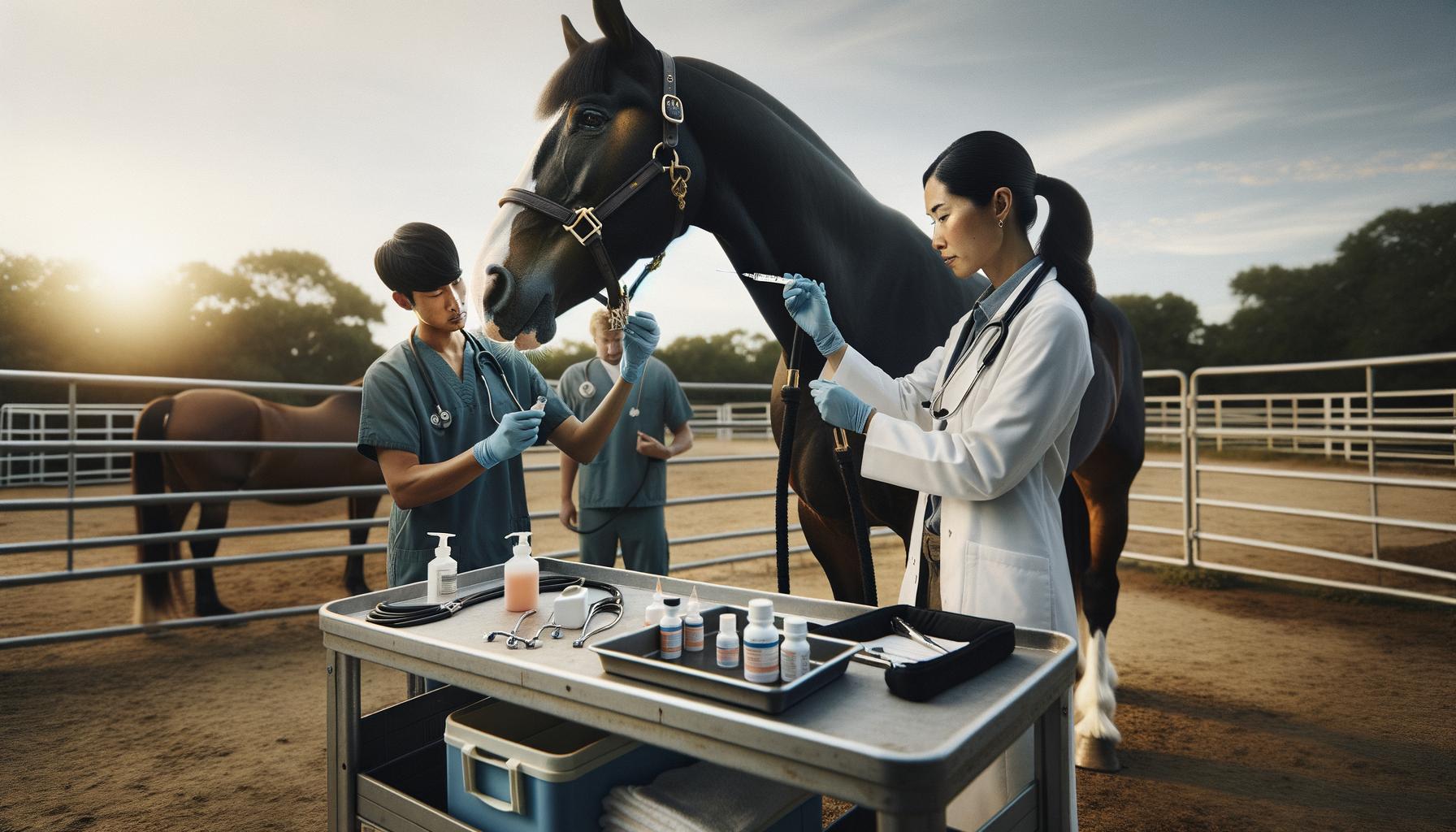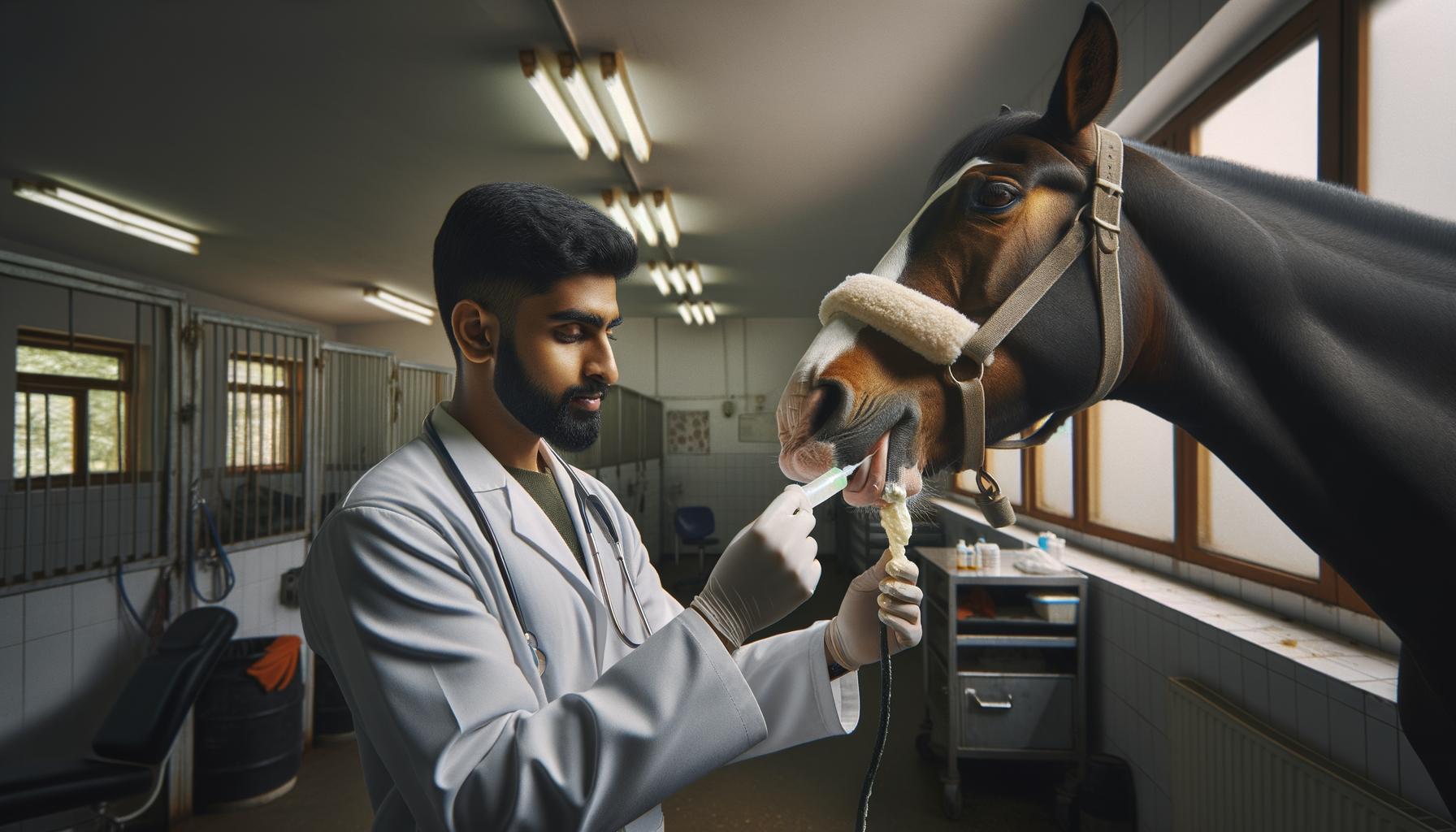Did you know that ivermectin paste is one of the most widely used treatments to control internal and external parasites in horses? This veterinary medication targets a broad range of parasites, helping maintain your horse’s health and performance. Understanding how to use ivermectin paste safely and effectively is essential for horse owners and caretakers aiming to protect their animals from illness without risking overuse or resistance. This guide will walk you through the practical aspects of ivermectin paste application, clarify important dosage considerations, explain its benefits and limitations, and highlight why consulting your veterinarian is key. By gaining a clear understanding of this trusted antiparasitic tool, you can make informed decisions that support your horse’s well-being, ensuring that parasite control contributes positively to their long-term care and overall vitality.
Understanding Ivermectin: What You Need to Know
Ivermectin revolutionized parasite control when introduced, rapidly becoming a cornerstone in equine health management. This powerful antiparasitic medication targets a broad range of internal and external parasites, helping to protect horses from worms, lice, and mites that thrive in outdoor environments. Understanding how ivermectin works and its role in horse care is essential for maintaining your horse’s health and avoiding parasitic complications.
At its core, ivermectin interferes with the nervous system of parasites, immobilizing and eliminating them without harming the horse. This selective action makes it an effective and generally safe option-when used correctly. However, effectiveness depends on recognizing which parasites are present, the appropriate timing of treatments, and following dosage recommendations closely. Misuse or overuse can lead to decreased efficacy and emerging resistance.
While ivermectin is a trusted tool, it is not a cure-all. Some parasites may require different treatments, and horses with certain health conditions might need alternative approaches. Horse owners benefit from combining veterinary guidance with regular fecal egg counts to tailor parasite control strategies. This personalized approach balances protection and sustainability, ensuring ivermectin remains a valuable resource in equine care for years to come.
- Wide spectrum effectiveness: Targets key equine parasites such as strongyles, roundworms, and bots.
- Convenient administration: Available as a paste, making dosing straightforward and accurate.
- Resistance concerns: Requires mindful use to prevent reduced drug sensitivity in worm populations.
- Veterinary partnership: Essential for safe, effective, and up-to-date treatment plans.

Veterinary Uses of Ivermectin in Horses
Ivermectin plays a vital role in protecting horses from a variety of internal and external parasites that can compromise their health. Veterinarians rely on ivermectin mainly to control gastrointestinal worms, such as strongyles and roundworms, and to manage botfly larvae that can cause irritation and digestive upsets. Its ability to paralyze and kill parasites by disrupting their nervous systems makes it a cornerstone of equine parasite management. However, effective use requires precise diagnosis of parasite infestations and timing treatments carefully to interrupt parasite life cycles.
Beyond its broad spectrum, veterinarians often integrate ivermectin into comprehensive parasite control programs tailored for individual horses and farm environments. For example, regular fecal egg counts help veterinarians determine when treatment is necessary, avoiding unnecessary dosing and slowing resistance development. In some equine populations, targeted deworming with ivermectin paste reduces parasite burdens while preserving beneficial gut flora. This balanced approach protects horses without relying on repeated blanket treatments.
Ivermectin also addresses external parasites like lice and certain mites, which can cause discomfort and secondary infections. Veterinary guidance ensures the correct formulation and method of administration, optimizing absorption and effectiveness. Importantly, ivermectin use in horses must be distinguished from veterinary products formulated for livestock, as dosing and formulations vary substantially. Using the correct equine-approved ivermectin paste eliminates the risks associated with inappropriate products designed for other species.
Veterinarians emphasize that while ivermectin is invaluable, it is not a one-size-fits-all solution. Certain parasites require alternate or adjunct treatments, and horses with pre-existing conditions or those on other medications need individualized care plans. Consulting with a veterinarian ensures safe, effective use and updates treatment strategies to reflect emerging research on resistance patterns and new parasitic threats. This professional partnership is the best way to maintain your horse’s health while responsibly managing antiparasitic treatments.
Proper Dosage Guidelines for Horse Ivermectin
Determining the correct dose of ivermectin paste is crucial for effective parasite control and the safety of your horse. Ivermectin works best when administered at the right amount relative to your horse’s weight. Underdosing can lead to ineffective treatment and contribute to parasite resistance, while overdosing might increase the risk of side effects. Therefore, accurate weight estimation or using a weight tape is the first step before dosing.
Veterinarians typically recommend a dose of 0.2 mg of ivermectin per kilogram of body weight, which equates to 1 milliliter (ml) of most commercial ivermectin pastes per 50 kilograms (110 pounds). Since horse weights vary greatly, from ponies under 200 kg to large draft horses exceeding 600 kg, using a scale or weight tape tailored for equines helps ensure accuracy. For example, a 500 kg (1100 lb) horse would require approximately 10 ml of paste. Always follow the product’s label instructions and adjust doses according to veterinary advice.
- Do not “eyeball” dosages or rely on guesswork-this common mistake can reduce effectiveness or cause harm.
- Single-dose administration: Ivermectin paste typically requires one dose per treatment cycle, often repeated every 8 to 12 weeks depending on parasite control strategy.
- Consider special cases: Foals younger than 6 months or horses with health issues require veterinary assessment before administration.
Why Precision Matters
Parasite burden and drug absorption can vary among individual horses. Too low a dose may not eliminate resistant parasite stages, allowing them to survive and multiply. Conversely, excessive dosing doesn’t enhance efficacy but might lead to toxicity, manifesting as neurological signs or hypersensitivity reactions, though these are rare with proper dosing.
In practice, veterinarians integrate fecal egg counts to guide when ivermectin is truly needed rather than using it on a fixed schedule. This precision medicine approach benefits both the horse’s health and long-term parasite control effectiveness.
| Weight of Horse (kg) | Approximate Dose of Ivermectin Paste (ml) |
|---|---|
| 200 | 4 |
| 400 | 8 |
| 500 | 10 |
| 600 | 12 |
In summary, the best outcomes arise from accurate weight measurement, adherence to recommended dosing (0.2 mg/kg), and consultation with your veterinarian to tailor treatment based on your horse’s specific needs. This balanced approach helps maintain parasite control, reduces resistance risk, and supports your horse’s overall well-being.

Administration Methods for Ivermectin Paste
Administering ivermectin paste effectively requires not only accurate dosing but also correct technique to ensure the full dose is delivered and absorbed. Horses can be wary when given paste orally, so patience and proper handling techniques make a significant difference in treatment success. Using a paste syringe designed for equines allows for a controlled and hygienic application directly into the horse’s mouth.
Before administration, ensure your horse is calm, ideally in a familiar environment. Approach the horse gently, placing your hand on its nose or lower jaw to gain their attention and prevent sudden movements. Insert the syringe slowly into the interdental space-the gap between the incisors and the premolars-on the side of the mouth. This location minimizes resistance and encourages swallowing. Slowly depress the plunger to release the paste towards the back of the tongue to help the horse swallow the medication efficiently.
- Avoid administering paste directly onto the front teeth, as this can lead to spitting out or incomplete swallowing.
- Do not mix ivermectin paste with feed or water, since this may decrease absorption and reduce effectiveness.
- Allow the horse some time to swallow before releasing them, and observe to ensure the paste was swallowed fully rather than spat out.
Tips for Difficult or Young Horses
If a horse resists or rapidly pulls away, it may help to have an assistant gently hold the head or secure the horse safely in stocks if available. For foals, dosing should be done gently with careful monitoring, as they may be less cooperative or more sensitive. Never force the syringe aggressively to prevent injury to the oral cavity or stress to the horse.
Consistency is important-administer ivermectin paste as directed by your veterinarian and avoid repeated dosing before the recommended interval. This regimen helps minimize parasite resistance and supports long-term health benefits.
Proper handling and administration methods not only ensure safety but also maximize ivermectin’s efficacy in parasite control. When in doubt, consulting your veterinarian for a demonstration or guidance can build confidence and promote better outcomes for both you and your horse.
Safety Considerations for Using Ivermectin
Ivermectin has been a game-changer in equine parasite control, but its safe use hinges on understanding key precautions. Safety starts with accurate dosing-over- or under-dosing can lead to ineffective treatment or adverse reactions. Always weigh your horse precisely and use the corresponding dose marked on the paste syringe. Avoid guesswork, as even small deviations may pose risks, especially for young, old, or debilitated horses.
Not all horses react identically to ivermectin. While generally well tolerated, some horses may exhibit hypersensitivity or mild side effects like temporary digestive upset. Watch for signs such as colic, diarrhea, or lethargy after treatment, and report anything abnormal to your veterinarian promptly. Horses heavily burdened with parasites may experience more pronounced reactions due to the sudden die-off of worms, which can release toxins.
Certain health conditions and concurrent medications may influence ivermectin’s safety profile. For instance, horses with liver or kidney impairment should be evaluated carefully before use, as these organs process most drugs. Avoid administering ivermectin paste too frequently or combining it with other dewormers unless following strict veterinary guidance to prevent cumulative toxicity and resistance development.
Best Practices to Enhance Safety
- Stick to veterinary recommendations: Use ivermectin only under guidance tailored to your horse’s health, weight, and environment.
- Monitor closely after treatment: Observe your horse for at least 24 hours post-administration for unusual behavior or symptoms.
- Handle and store paste properly: Keep medication in a cool, dry place, away from children and other animals, and never use expired products.
- Use dedicated equipment: Employ paste syringes designed for horses to avoid contamination and ensure dose accuracy.
Understanding these safety considerations empowers owners to protect their horses while maximizing ivermectin’s benefits. Never hesitate to consult your veterinarian if uncertain about dose, timing, or potential risks. Their expertise is invaluable to navigate complexities and safeguard your horse’s well-being effectively.
Side Effects and Risks in Horses
Ivermectin is widely recognized for its effectiveness and relative safety in horses, but like any medication, it carries some risks worth understanding. Most horses tolerate ivermectin paste well, showing few or no adverse effects when administered correctly. However, reactions can occur and are often linked to factors such as existing health issues, heavy parasite loads, or incorrect dosing.
Sometimes, a horse treated with ivermectin might display mild symptoms like temporary digestive upset, including mild colic or diarrhea. These mild signs often result from the sudden death of parasites releasing toxins into the horse’s body-a reaction sometimes called a “die-off” or Jarisch-Herxheimer-like response. It is essential to recognize these signs early and provide supportive care while consulting a veterinarian if symptoms worsen or persist.
More rarely, neurological issues such as wobbliness, weakness, or depression can develop. These effects are mostly documented in horses with compromised blood-brain barriers due to brain injury or disease, which allows the drug to affect the nervous system more readily. Such cases are uncommon but underscore the importance of veterinary evaluation before treatment, especially in horses with pre-existing neurological conditions.
- Risk factors include: Young foals, elderly horses, or those with liver or kidney impairment may process ivermectin less effectively, increasing chances of side effects.
- Heavy parasite burdens: Horses with large worm loads may experience more intense reactions as parasites die off rapidly.
- Incorrect dosing: Administering too high or too frequent doses can lead to toxicity, so careful measurement based on accurate weight is critical.
If you notice any unusual signs-such as weakness, excessive salivation, tremors, or loss of coordination-after applying ivermectin, seek veterinary advice immediately. Early intervention can prevent complications and ensure your horse recovers safely.
Monitoring and Prevention
Ensuring your horse’s safety starts with following label directions and your veterinarian’s guidance precisely. Regular health assessments before administering ivermectin can help identify individuals at increased risk. After treatment, observe your horse closely for at least 24 hours, especially if it’s their first exposure to ivermectin or if you suspect a high parasite burden. Maintaining this vigilance can help you catch side effects early and safeguard your horse’s well-being.
By understanding these possible risks without undue alarm, you can confidently use ivermectin as part of a balanced parasite control program that prioritizes your horse’s health and safety. Remember, consulting your vet remains the best way to tailor treatment decisions to your horse’s unique needs and circumstances.
Debunking Myths About Ivermectin for Horses
Ivermectin is often surrounded by misconceptions that can lead to confusion or misuse. One widespread myth is that ivermectin is a cure-all for every parasite problem in horses. While it is highly effective against many internal and external parasites, it does not treat all types. For example, it does not kill tapeworms effectively, so combining it with other treatments targeting those parasites is often necessary. This nuance is important because relying solely on ivermectin can leave some parasite burdens untreated, potentially undermining your horse’s health and parasite control efforts.
Another common misunderstanding is that ivermectin can be dosed indiscriminately without risks. In truth, correct dosing based on your horse’s accurate weight and health status is critical. Overdosing or frequent unnecessary use increases the risk of toxicity and encourages parasite resistance. For instance, a heavy parasite load might cause a temporary “die-off” reaction after ivermectin treatment, leading some owners to mistakenly believe the drug itself is harmful rather than understanding this as a natural immune response to dying parasites. Awareness of these reactions helps owners respond calmly and seek timely veterinary support when needed.
- Myth: Ivermectin is safe to use in all horses without veterinary advice.
- Reality: Horses with neurological issues, foals, or those with impaired liver or kidney function need careful evaluation prior to treatment.
- Myth: Ivermectin use does not contribute to parasite resistance.
- Reality: Frequent or improper use can lead to resistance, reducing long-term effectiveness.
It’s also important to dispel fears about ivermectin causing neurological damage in most horses. Such adverse effects are exceedingly rare and usually linked to specific conditions like a compromised blood-brain barrier or excessive dosing. Responsible use guided by a veterinarian significantly minimizes these risks. Instead of fearing the medication, focus on understanding how to use it wisely within a broader parasite control program, which includes regular fecal testing and alternating appropriate dewormers as recommended by your vet.
By separating fact from fiction, you empower yourself to use ivermectin effectively and safely. Always seek professional guidance tailored to your horse’s individual health and parasite status. This approach prevents misuse and maximizes benefits, ensuring your horse remains healthy and comfortable without falling prey to common misconceptions.
Ivermectin Resistance: What to Watch For
It’s easy to underestimate the adaptive power of parasites, but resistance to ivermectin in horses is a growing concern that requires attention. Parasites can develop genetic changes allowing them to survive treatments that once effectively controlled them. When this happens, ivermectin’s ability to protect your horse from infestations diminishes, leading to recurring infections and greater health risks.
Recognizing Signs of Reduced Effectiveness
One clear indicator of resistance is consistently high parasite egg counts in fecal tests even after regular ivermectin treatments. If your horse continues to scratch, loses weight, or shows signs of gastrointestinal upset despite correct dosing, consider that parasites may be becoming less susceptible. Tracking your horse’s fecal egg counts through veterinary-suggested fecal egg count reduction tests (FECRT) over time is critical in spotting resistance early.
How Resistance Develops
Resistance often results from overuse or misuse of ivermectin-for example, treating too frequently without proper diagnostic confirmation, under-dosing due to inaccurate weight estimation, or reliance on ivermectin alone instead of rotating with other dewormer classes. These practices create selective pressure, allowing resistant parasites to multiply while susceptible ones are eliminated. This gradually shifts the parasite population toward resistance.
Practical Steps to Combat Resistance
- Implement strategic deworming: Rather than routine blanket treatments, use fecal egg counts to target only horses with significant parasite burdens.
- Rotate dewormers: Alternate classes of anthelmintics responsibly, under veterinary guidance, to reduce selection pressure.
- Correct dosing is essential: Weigh your horse accurately to ensure effective doses that minimize survival of partially resistant parasites.
- Maintain good pasture management: Regularly clean stalls, avoid overgrazing, and rotate pastures to break parasite life cycles.
By adopting these measures, you protect ivermectin’s usefulness as a key tool in your horse’s parasite control program. If resistance is suspected, work closely with your veterinarian to test and adjust treatment protocols tailored to your horse’s specific parasite risks. Addressing resistance proactively can help preserve the long-term health and well-being of your horses and the efficacy of ivermectin for future use.
Alternatives to Ivermectin in Animal Care
Parasite control in horses is complex and demands a toolbox broader than ivermectin alone. As resistance becomes more common, exploring alternative treatments is essential to maintaining effective parasite management and safeguarding horse health. Several classes of dewormers offer different modes of action that can complement or substitute ivermectin when used judiciously.
- Benzimidazoles – Drugs like fenbendazole and oxibendazole disrupt the energy metabolism of worms. They are effective against some intestinal parasites but may face resistance in certain regions. Rotating these with ivermectin can reduce selection pressure on parasites.
- Pyrantel Salts – Pyrantel pamoate and pyrantel tartrate target neuromuscular activity in parasites, causing paralysis and expulsion. This class is often used for controlling tapeworms and some roundworms and provides a useful alternative in rotation programs.
- Moxidectin – Chemically related to ivermectin but with a longer duration of activity, moxidectin is potent against encysted small strongyles, which some other treatments miss. However, it should be used carefully, especially in young or debilitated horses due to increased potency.
Beyond Chemical Dewormers
Non-chemical approaches can also play a significant role in parasite control. Good pasture management, including rotational grazing, pasture rest, and manure removal, interrupts parasite lifecycles naturally. Integrating fecal egg count testing to target treatment only when necessary minimizes overuse of anthelmintics, preserving their effectiveness. Additionally, emerging biological control methods, such as nematode-trapping fungi, are under investigation and show promise as environmentally friendly supplements to conventional treatments.
Consultation Is Key
Each horse’s parasite burden, health status, and environment differ. The smartest approach combines regular veterinary advice, fecal testing, and strategic use of multiple anthelmintic classes. Your veterinarian can design a customized deworming schedule that balances efficacy and resistance management, ensuring long-term protection.
By embracing diverse control options and avoiding over-reliance on ivermectin, you help sustain your horse’s health and support responsible stewardship of these valuable medications. For safe, effective care, always seek guidance tailored to your unique situation.
Regulatory Status of Ivermectin Products
Ivermectin remains one of the most widely used anthelmintics for equine parasite control, but its availability and use are tightly regulated to ensure safety, efficacy, and responsible stewardship. Regulatory bodies oversee the approval, labeling, manufacturing, and distribution of ivermectin products for horses, setting standards that protect both animal health and public safety. These regulations help prevent misuse that could lead to resistance or adverse effects.
In many countries, ivermectin paste for horses is classified as a veterinary medicinal product. This means it is legally available only through licensed veterinarians or authorized suppliers, who provide the correct dosage and usage information based on a professional assessment. Over-the-counter availability varies by region, but veterinary guidance remains strongly recommended to tailor treatment to the individual animal’s needs and parasite exposure.
What Regulations Mean for Horse Owners
Following approved product labels is crucial. These labels include important details such as:
- Active concentration – Ensuring the paste contains the correct ivermectin dosage per gram for effective treatment.
- Withdrawal periods – Times to wait before using horse products (like milk or meat, where applicable) to avoid residues.
- Target species and parasites – Specifying which parasites the product is effective against, preventing off-label or inappropriate use.
- Storage instructions – Preserving product stability and efficacy.
Ignoring these guidelines can compromise treatment success and may cause legal or health repercussions.
Global Variations and Compliance
Regulatory oversight can differ widely. For example, in the United States, ivermectin products for horses undergo evaluation by the Food and Drug Administration’s Center for Veterinary Medicine (FDA-CVM). Europe follows regulations set by the European Medicines Agency (EMA), and other countries have their own governmental agencies. Always confirm that products meet your local regulatory standards, especially when importing. This ensures:
- Product quality and authenticity are maintained.
- Safety data has been reviewed for your region’s specific needs.
- Legal liability is minimized if adverse reactions occur.
Staying Informed: The Role of Your Veterinarian
Because regulations evolve with emerging scientific information and resistance patterns, veterinarians stay current on approved ivermectin products and safety updates. They can help you navigate any changes in legislation or product availability. Consulting with your veterinarian before purchasing or administering ivermectin paste ensures you receive legally compliant, effective treatments based on the latest standards.
Understanding the regulatory framework empowers you to make informed choices that safeguard your horse’s health, maintain compliance, and promote sustainable parasite management practices.
User Experiences: Case Studies and Testimonials
Few treatments for equine parasites carry as much longstanding trust as ivermectin paste. Many horse owners share stories of improved health and vitality following carefully guided treatments. For example, a riding stable manager from Kentucky reported a marked reduction in colic incidents and improved coat condition after introducing a veterinarian-supervised ivermectin protocol tailored to their horses’ parasite loads. Such real-world accounts illustrate how following recommended dosage and treatment intervals can yield consistent benefits.
However, experiences vary, highlighting the importance of context and professional guidance. One case involved a horse with mild adverse reactions after an improperly dosed administration, underscoring the need for accurate weight assessments and practitioner oversight. Another owner observed a temporary increase in coughing following treatment, which was later explained as the horse’s immune response to dying parasites-not an allergic reaction. These nuances emphasize that ivermectin’s effectiveness depends on correct use and individualized management.
Lessons from Our Community
- Accurate dosing matters: Many users stress the importance of weighing horses before dosing to ensure maximum efficacy and minimize risk.
- Regular veterinary check-ups: Routine fecal egg counts combined with professional advice help avoid overuse and resistance development.
- Observation post-treatment: Monitoring horses after administration can catch rare side effects early and improve overall safety.
Some horse owners have also experimented with combining ivermectin with other parasite control methods under veterinary supervision, reporting enhanced parasite management without increased side effects. This balanced approach reflects growing awareness that integrated parasite control strategies work best.
Ultimately, personal accounts consistently demonstrate the value of a knowledgeable vet guiding ivermectin use. While ivermectin paste is a powerful tool, its success hinges on informed application tailored to each horse’s needs. Before beginning treatment, engaging a veterinarian is the best way to ensure safe, effective, and responsible parasite control.
Consulting Your Veterinarian: Key Questions to Ask
When considering ivermectin paste for your horse, a conversation with your veterinarian can be the most valuable step toward safe and effective parasite control. Veterinarians bring expertise not only in dosing and administration but also in interpreting your horse’s unique health needs and environmental factors that might affect treatment outcomes. Asking the right questions helps you gain confidence in the process and ensures you’re aligned with best practices backed by science and clinical experience.
- What is the appropriate dosing schedule for my horse’s specific parasite risks? Parasite burdens vary by geography, season, and individual horse management. Your vet can recommend targeted dosing intervals and quantities based on fecal egg counts and parasite species prevalent in your area.
- How should I accurately weigh my horse? Proper dosing depends on precise weight measurement rather than estimation. Your veterinarian may offer practical methods or tools to obtain an accurate weight, helping to avoid under- or overdosing.
- Are there any health conditions or medications in my horse’s history that might affect ivermectin use? Certain health issues or concurrent medications can influence ivermectin’s safety or efficacy. Sharing a full health history enables your veterinarian to adjust plans or suggest alternatives.
- What signs of adverse reactions should I watch for after treatment? Although rare, some horses may show mild side effects or immune responses to dying parasites. Understanding what to expect and when to seek veterinary attention builds proactive care.
- How can we monitor for developing ivermectin resistance? Resistance can reduce drug effectiveness over time. Your vet can guide regular fecal testing and integrated parasite management strategies that minimize this risk.
- Can ivermectin be safely combined with other parasite control methods? A holistic approach may involve rotation with other anthelmintics or environmental management. Vet advice ensures combinations do not cause harmful interactions or resistance pressure.
- What regulatory restrictions should I be aware of regarding ivermectin products? Regulations may affect product choice, usage frequency, and withdrawal times. Clinician guidance keeps treatments compliant with veterinary and equine industry standards.
Real-world veterinary consultations often reveal nuanced insights. For example, a vet might recommend delaying treatment if a horse’s parasite load is currently low to avoid unnecessary intervention and resistance buildup. They can also perform follow-up fecal egg counts to confirm treatment success or diagnose emerging issues. Establishing this ongoing partnership transforms parasite control from guesswork into a precise, evidence-based regimen tailored for your horse’s health and longevity.
Ultimately, thinking of your veterinarian as a trusted collaborator encourages thoughtful, informed decisions instead of one-size-fits-all solutions. This relationship empowers you to navigate the complexities of ivermectin use confidently, improving outcomes and safeguarding your horse’s well-being now and in the future.
FAQ
Q: How long does it take for ivermectin paste to start working in horses?
A: Ivermectin paste typically begins working within 24 hours after administration, targeting internal and external parasites effectively. Full parasite clearance may take up to a few days. Always follow the dosing schedule outlined in the veterinary guide to ensure optimal parasite control and monitor your horse’s response closely.
Q: Can ivermectin paste be safely used in pregnant or lactating mares?
A: Ivermectin paste is generally considered safe for use in pregnant and lactating mares when used at recommended dosages. However, always consult your veterinarian before administering to ensure the health of both mare and foal, as individual conditions may require special precautions.
Q: What are the signs of ivermectin overdose in horses and how should it be handled?
A: Signs of ivermectin overdose include excessive drooling, lethargy, uncoordinated movement, and in severe cases, neurological issues. If overdose is suspected, contact your veterinarian immediately. Providing supportive care and monitoring under professional guidance is crucial for recovery.
Q: How should ivermectin paste be stored to maintain its effectiveness?
A: Store ivermectin paste in a cool, dry place away from direct sunlight and extreme temperatures. Proper storage helps maintain its potency and safety. Always check the expiration date and dispose of expired products responsibly to ensure your horse receives effective treatment.
Q: Can ivermectin paste be used to control both internal and external parasites in horses?
A: Yes, ivermectin paste is effective against a broad spectrum of internal parasites like roundworms, as well as some external parasites such as certain types of mites and lice. For comprehensive parasite control, follow treatment guidelines and consult your veterinarian about integrated pest management strategies.
Q: What factors influence the effectiveness of ivermectin paste in different horse breeds or ages?
A: Effectiveness can vary based on the horse’s age, weight, metabolism, and breed-specific sensitivities. Younger or older horses might metabolize ivermectin differently, affecting efficacy. Adjust dosages carefully according to veterinary advice and monitor for any adverse effects to ensure safe, effective treatment.
Q: How often should ivermectin paste be administered to prevent parasite resistance in horses?
A: To prevent parasite resistance, ivermectin paste should be administered according to a veterinarian-approved schedule, usually every 8 to 12 weeks depending on parasite risk and local recommendations. Avoid overuse and combine with other parasite control methods for sustainable efficacy.
Q: Are there any known drug interactions when using ivermectin paste with other equine medications?
A: Ivermectin may interact with other medications, especially those affecting the nervous system or liver metabolism. Always inform your veterinarian about all treatments your horse is receiving to avoid harmful interactions and ensure safe, coordinated care.
Explore more detailed guidance in the [Proper Dosage Guidelines for Horse Ivermectin](#), [Safety Considerations](#), and [Consulting Your Veterinarian](#) sections for tailored advice and best practices.
Future Outlook
Proper use of ivermectin paste remains a cornerstone in maintaining your horse’s health by effectively controlling parasitic infections. Understanding the correct dosage and application techniques ensures safety and maximizes benefits, helping you safeguard your equine companion with confidence. If you have any lingering questions or want to explore advanced parasite management strategies, our detailed guides and expert resources are just a click away.
Take the next step by exploring related topics such as equine deworming schedules and parasite resistance, or join our newsletter for ongoing updates tailored to horse care professionals and enthusiasts alike. Your horse’s well-being is paramount-consult your veterinarian to tailor ivermectin treatments to your specific needs and stay informed on best practices. Share your experiences or ask questions below to connect with our community and keep the conversation going.






